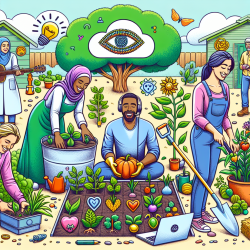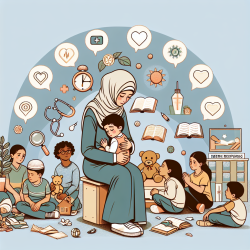Introduction
In the realm of speech-language pathology, particularly when working with children, the importance of understanding broader social issues cannot be overstated. One such issue is intimate partner violence (IPV), which has far-reaching implications not only for the direct victims but also for children who may witness such violence. This blog post delves into the findings of a study titled "Motivations and Barriers to Help-Seeking Among Female Victims of Intimate Partner Violence in Ghana," exploring how practitioners can enhance their skills by integrating these insights into their practice.
Understanding the Research
The study conducted by Rohn and Tenkorang (2022) utilized qualitative data from 30 women across three regions in Ghana to explore the motivations and barriers to help-seeking among victims of IPV. The thematic analysis revealed a low reporting rate to formal support networks, with a preference for informal sources such as family and friends. Key motivations for seeking help included fatigue, severity of abuse, and trust in family members. Conversely, barriers included fear of divorce, stigmatization, lack of trust in formal channels, and sociocultural norms.
Implications for Practitioners
Practitioners working with children, especially in the context of speech-language pathology, can draw several lessons from this research:
- Recognize the Impact of IPV on Children: Children who witness IPV may exhibit speech and language delays or disorders. Understanding the family dynamics and potential exposure to violence can inform tailored interventions.
- Build Trust with Families: Trust emerged as a critical factor in help-seeking. Practitioners should strive to build a trusting relationship with families, creating a safe space for open communication.
- Awareness of Cultural Norms: Sociocultural norms can significantly impact help-seeking behaviors. Practitioners should be culturally sensitive and aware of these dynamics when working with families from diverse backgrounds.
- Advocate for Formal Support Systems: Encourage families to utilize formal support systems by providing information and resources, addressing any mistrust or misconceptions they may have.
Encouraging Further Research
While this study provides valuable insights, it also highlights the need for further research, particularly in understanding the help-seeking behaviors of IPV victims in different cultural contexts. Practitioners are encouraged to engage in or support research efforts that explore these dynamics, contributing to a more comprehensive understanding of IPV and its effects on children.
Conclusion
Integrating the findings from the study on help-seeking behaviors among IPV victims in Ghana can significantly enhance practitioner skills. By recognizing the impact of IPV on children, building trust with families, being culturally sensitive, and advocating for formal support systems, practitioners can create better outcomes for children affected by IPV. For those interested in delving deeper into the original research, please follow this link: Motivations and Barriers to Help-Seeking Among Female Victims of Intimate Partner Violence in Ghana.










